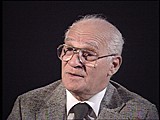You searched for: ���������������������������������������������������������������������cxfk69���just
<< Previous | Displaying results 131-140 of 572 for "���������������������������������������������������������������������cxfk69���just" | Next >>
-
Mayer Adler describes surviving as a child in Auschwitz
Oral HistoryMayer grew up in a rural town that was occupied by Hungary in 1940. After Germany occupied Hungary in March 1944, Mayer and his family were forced into a ghetto. They were then deported to the Auschwitz camp in Poland, where Mayer's parents and brothers perished. Mayer was selected for forced labor, and was later transferred to a satellite camp of Dachau, in Germany. He was liberated from Dachau in 1945. Sponsored by a children's committee, he immigrated to the United States.
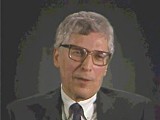
-
Liny Pajgin Yollick describes fleeing to France from Antwerp
Oral HistoryIn May 1940, the Germans occupied the Netherlands. In 1942, it took Liny, her mother, and her sister six months to escape to southern France. They pretended to be Protestant, obtained visas to travel through Spain and Portugal, and were on one of the last trains to cross into Spain after the Germans took over southern France. They boarded a Portuguese ship bound for Dutch Guiana (Suriname). Liny was placed in a refugee camp, and then worked in the Dutch embassy in Washington D.C. She eventually settled in…
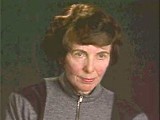
-
Leo Melamed describes going to school in prewar Bialystok
Oral HistoryLeo was seven years old when Germany invaded Poland in September 1939. Before the war, Leo's father was a mathematics teacher and member of the Bialystok City Council. Fearing arrest, Leo's father fled Bialystok for Vilna just before the German occupation. Leo and his mother eventually joined his father in Vilna. After the Soviets occupied Vilna, Leo's father obtained transit visas to Japan. The family left Vilna in December 1940, traveled across the Soviet Union on the Trans-Siberian Express, and arrived…
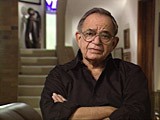
-
Preben Munch-Nielsen describes the Danish people's responsibility to help their Jewish fellow citizens
Oral HistoryPreben was born to a Protestant family in Snekkersten, a small fishing village. The Germans invaded Denmark in 1940. Preben became a courier in the resistance. When the Gestapo (German Secret State Police) began hunting down Jews in Denmark in October 1943, Preben helped hide refugees in houses near the shore and led them to boats which took them to Sweden. Preben himself had to take refuge in Sweden in November 1943. He returned to Denmark in May 1945.
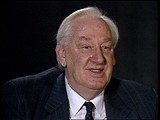
-
Ruth Meyerowitz describes deportation to and conditions in Ravensbrück
Oral HistoryIn Frankfurt, Ruth's family faced intensifying anti-Jewish measures; her father's business was taken over and Ruth's Jewish school was closed. In April 1943, Ruth and her family were deported to Auschwitz. Ruth was forced to work on road repairs. She also worked in the "Kanada" unit, sorting possessions brought into the camp. In November 1944, Ruth was transferred to the Ravensbrueck camp system, in Germany. She was liberated in May 1945, during a death march from the Malchow camp.
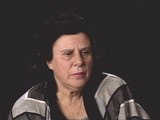
-
Darrell Romjue describes how US troops encoutered camps such as Mauthausen
Oral HistoryDarrell Romjue is a veteran of the 11th Armored Division. During the invasion of German-held Austria, in May 1945 the 11th Armored (the "Thunderbolt" division) overran two of the largest Nazi concentration camps in the country: Mauthausen and Gusen.
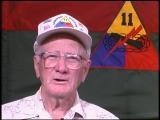
-
Ernest G. Heppner describes learning about the Holocaust and the fate of his relatives
Oral HistoryErnest's family owned a factory that made matzah, the unleavened bread eaten during Passover. In February 1939, three months after Kristallnacht (the "Night of Broken Glass" pogroms), Ernest and his mother fled to Shanghai, one of few havens for refugees without visas. His father and sister stayed behind in Germany; they perished during the Holocaust. A brother escaped to England. Ernest and his mother found work in Shanghai. In 1947, he came to the United States with his wife, whom he met and married in…
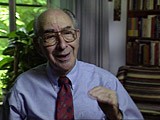
-
Sophie Turner-Zaretsky describes how her teddy bear was given his name
Oral HistorySophie was born Selma Schwarzwald to parents Daniel and Laura in the industrial city of Lvov, two years before Germany invaded Poland. Daniel was a successful businessman who exported timber and Laura had studied economics. The Germans occupied Lvov in 1941. After her father's disappearance on her fifth birthday in 1941, Sophie and her mother procured false names and papers and moved to a small town called Busko-Zdroj. They became practicing Catholics to hide their identities. Sophie gradually forgot that…
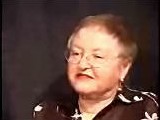
-
William (Welek) Luksenburg describes the first night of the German invasion of Poland
Oral HistoryShortly after the German invasion of Poland in September 1939, William's family was ordered into a ghetto and his brother went to a work camp. William bribed officials to discharge his brother from a hospital destined for evacuation to Auschwitz. Later, after escaping from a prison camp to tend to his brother, William was jailed. He was sent to Blechhammer, Gleiwitz (where he met his future wife), and other camps. William collapsed during a death march near the Austrian border, but was then liberated. His…
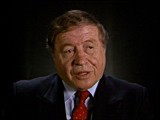
-
Leo Schneiderman describes conditions in the Lodz ghetto
Oral HistoryThe Germans invaded Poland in September 1939. Leo and his family were confined to a ghetto in Lodz. Leo was forced to work as a tailor in a uniform factory. The Lodz ghetto was liquidated in 1944, and Leo was deported to Auschwitz. He was then sent to the Gross-Rosen camp system for forced labor. As the Soviet army advanced, the prisoners were transferred to the Ebensee camp in Austria. The Ebensee camp was liberated in 1945.
